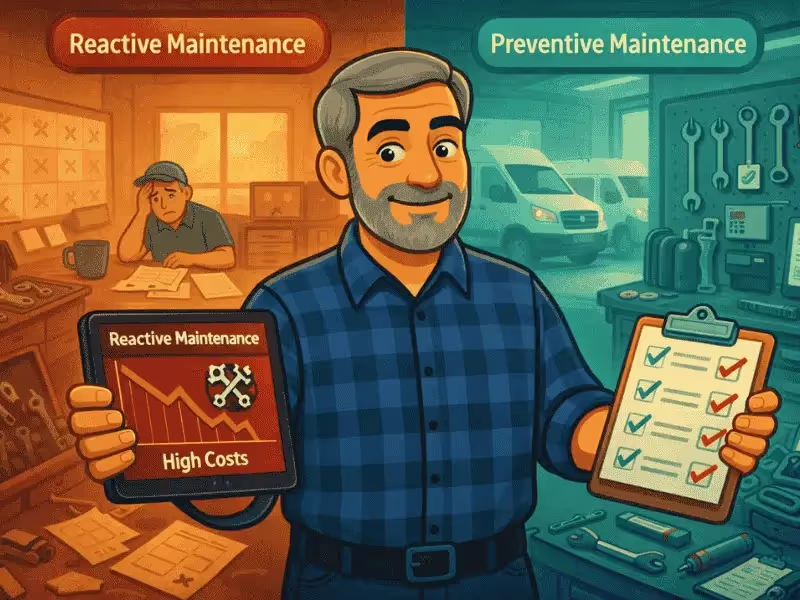Key Takeaways
- Track Key Metrics: Know your cost per mile, fuel usage, and seasonal shifts to stay profitable.
- Cut Major Expenses: Reduce fuel, maintenance, and idle time with smart planning and training.
- Use Technology: Fleet management tools optimise routes, monitor drivers, and lower costs.
- Plan for 2025: Rising insurance and congestion make cost control + data-driven decisions essential.
Running a trucking fleet has always been a tough business, but in today’s world, managing costs has become absolutely critical. Between fluctuating fuel prices, rising insurance rates, and growing maintenance expenses, profits can slip through your fingers faster than ever.
But here’s the good news: by understanding the financial variables that impact your operation and making smarter decisions based on them, you can stay ahead of the curve, reduce your operational costs, and set your fleet up for long-term success.
In this guide, we’ll break down the key trucking costs you need to watch, the smartest ways to lower your expenses, and why now is the perfect time to take a data-driven approach to fleet management.
Why Tracking Trucking Costs Matters in 2025?
In 2023, the American Transportation Research Institute (ATRI) reported that the marginal cost of trucking reached a record high of $2.270 per mile despite falling fuel prices and a cooling economy. Insurance, maintenance, and driver wages all continued to climb, putting even more pressure on fleet operators.
Without a clear understanding of where your money is going, it’s easy to lose control.
Tracking and managing your expenses is the foundation of a sustainable, profitable trucking business.
Key Trucking Cost Metrics Every Fleet Manager Must Track

Running a fleet means managing multiple expense categories—some predictable, others fluctuating with market conditions. Having a clear picture of where your money goes helps you control spending and boost profitability. Below is a quick snapshot of the major trucking costs every fleet should track.
Download our free Semi Truck Inspection Report
Practical Strategies to Lower Your Trucking Costs

Lowering your expenses is about consistent, smart improvements. Here’s how successful fleets are trimming their costs:
Optimize Route Planning
Route optimization saves fuel, time, and maintenance costs. Advanced GPS and fleet management systems can now reroute drivers in real time to avoid traffic jams, bad weather, and construction zones.
Benefits:
- Fewer miles driven
- Happier drivers
- More on-time deliveries
- Lower fuel consumption
Implement Regular Maintenance Programs
Skipping scheduled maintenance may save money today but will cost much more down the road.
A blown engine or failed transmission can sideline a truck for days, costing thousands in repairs and even more in lost revenue.
Action Plan:
- Set strict preventative maintenance schedules
- Digitise maintenance logs
- Track service trends to spot potential problems early
Use Fuel Discount Programs
Fuel discount cards and networks are one of the easiest ways to reduce your biggest variable cost. Many national and regional programs offer substantial savings.
Best Practices:
- Train drivers on using the discount network
- Monitor where drivers fuel up
- Review monthly fuel reports to spot irregularities
Teach Fuel-Efficient Driving
Good driving habits make a real difference:
- Maintain steady speeds
- Minimize idling
- Inflate tires properly
- Use cruise control where safe
Training drivers on fuel-efficient techniques and rewarding good performance can cut fuel costs by up to 10% fleetwide.
Minimize Idle Time
Idling wastes around one gallon of fuel per hour. Over a year, that adds up to thousands of wasted dollars.
Solutions:
- Install idle shutdown systems
- Encourage drivers to turn off engines during long stops
- Use APUs (auxiliary power units) for cabin climate control
Maximize Load Efficiency
Every empty trailer is a lost opportunity. Filling backhauls, combining loads where possible, and reducing partial-load trips all boost profitability.
Smart load-matching technology can now find available freight near your drivers, cutting empty miles significantly.
2025 Industry Outlook: What to Expect
Looking ahead, the trucking landscape is expected to stabilize, but costs won’t magically drop on their own.
Trends to watch:
- Insurance premiums are likely to keep rising
- Fuel prices should remain relatively stable unless major global disruptions occur
- Congestion costs will increase as urban freight bottlenecks worsen
- Fleets with strong technology adoption will pull ahead of slower competitors
- Environmental regulations may soften slightly under new leadership, lowering compliance costs for some carriers
Fleet managers who plan ahead, control costs rigorously, and embrace technology will be in the best position to succeed.
How Technology Helps Cut Fleet Expenses
Managing a modern fleet manually is like using paper maps in a GPS world: slow, outdated, and risky.
Today’s fleet management platforms can:
- Track fuel usage and maintenance automatically
- Optimize driver routes
- Monitor driver behavior
- Identify underperforming assets
- Centralise all cost data in one place for easy decision-making
Investing in fleet technology isn’t a competitive advantage.
Drive Smarter, Not Just Harder
Trucking has always been a tough industry, but the rewards are there for those who manage smarter. By understanding and controlling your costs per mile, reducing waste, optimizing your operations, and making data-driven decisions, you can take your fleet from surviving to thriving in 2025. The road ahead may be challenging, but with the right tools and mindset, you can drive your business toward a more profitable, stable future.
Ready to put your fleet on the fast track to success? Our fleet management solutions help you track expenses, optimize routes, monitor fuel usage, and stay ahead of maintenance needs.
Ready to drive smarter, lower your costs, and maximize your profits? Get started with Simply Fleet today and transform your operations.



.png)








.png)


.png)
%20(1).avif)








